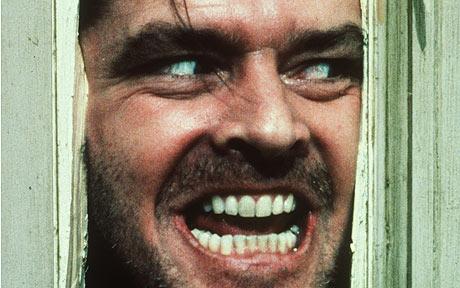This is, oddly enough, an article about writing an article. A former student of mine who now edits the university newspaper asked if I would write an OpEd piece for the upcoming Halloween issue. Touched (but mainly flattered), I accepted immediately, not considering the ramifications of my commitment. I was attempting to make a case for Halloween on a Christian campus notoriously divided on even acknowledging the holiday in the first place.
Initially, the spooky timing of the offer appeared to be fate—as a literature teacher, I focus on the genre of the Gothic: abandoned castles, imaginary monsters of all shapes and sizes, murderous plots concocted by rogue monks, all subversively pointing to some latent social critique. I arrogantly planned for a deeply-theoretical exploration of the use of “doubling” in Gothic novels like Doctor Jekyll and Mr. Hyde, or stories like Poe’s “Fall of the House of Usher,” and how this physical doubling mirrors the spiritual division of our soul, comprised of equal parts ‘saint’ and ‘sinner,’ both vying for domination of the body. I realized halfway through the writing process that I, like so many of my students before me, had not addressed the prompt.
The question I was so obviously attempting to skirt around was glaring in its absence: “Sure, but why should Christians even pay attention to these areas of human culture so festered with fear? How is it edifying for Christians to not only give homage to, but study fear? “
This is a question easily explained away to my Gothic Lit students with credible sources desperately printed off the Internet and my own impassioned rhetoric, but when it comes to a campus-wise discourse, I am honest enough to admit defeat. I am also honest enough to admit that my biblical knowledge is embarrassingly tertiary, falling closely behind my grasp of literature and human psychology. Trying to make a case for Halloween—or on a greater level, the study of fear itself—would venture into my intellectual wilderness.
While Biblical exegesis is not my strong suit, I do know humans. Within literature and reality, I observe humanity like a set of clueless pawns, responding to the least enlightened motivations like pleasure, desire, power, and yes, fear. I agree that is it base, but you can’t fault me for being fascinated. As Christians, it can be all too easy to splice ourselves into Body and Soul. While the Soul remains pure, our Body ruins the party with all those “human” mistakes, weighed down with Adam’s original sin and not doing us any favors when it comes to seeking God.
I can’t argue with this spiritually, but it does seem a rather unfair gesture; after all, our body was created in the image of God Himself, and while I’m not going to humiliate myself by making assumptions about the meaning of life, surely interacting and communing with both each other and the natural world must have been somewhere on the blueprint.
These base motivations—like fear—are pushed unceremoniously under the umbrella of sinfulness simply because, as one of my colleagues emphatically told me, we shouldn’t have them at all. “Christ’s resurrection banished the fear of death,” he continued. “So we should live our lives fearlessly as Christians.”
“But we don’t,” I said, stupidly.
“But we should. We shouldn’t be motivated by fear.”
“But we are.”
Our conversation was frustrating because he and I were operating on two different levels—the idealistic and the realistic. He was right—idealistically, Christ’s victory over death should and does eliminate the need for fearfulness in our physical and spiritual lives. Not only has mortal death lost all power, but we also have the promise of eternal communion with God, one not dictated by our human goodness or works, but solidified by our brokenness and need for salvation. There is literally no need to fear.
However—we do. We are fearful creatures, motivated not only in our human relationships by the threat of pain, loss, or loneliness, but in our relationship with God. In hindsight, we see the theologian Jonathan Edwards’ fire and brimstone sermons to be a fear-mongering attempt to ‘get meat in the seats,’ that really, he shouldn’t need to appeal to our base motivation of fear. Idealistically, our love and adoration of God should be enough to motivate us towards seeking biblical truth. But let’s be realistic—we fear Hell. Hell scares the hell out of us.
I have a complicated relationship with my own fear; one I feel can only be properly explained by not only literature, but yet another cultural phenomena which has historically divided Christians for the past two decades—Harry Potter. For those of you who haven’t read the books or seen the movies, bear with me:
When Lord Voldermort attempted to kill Harry as a baby, the spell backfired, leaving Harry with not only a scar, but with a number of Voldermort’s personal traits and attributes. For example, Voldermort could talk to snakes, so now Harry could talk to snakes. The most significant of these was Harry’s ability to sometimes slip into Voldermort’s mind uncontrollably—hear his thoughts, feel his emotions, see through his eyes. Professors and friends pronounced this “gift” unequivocally bad—it was unhealthy and unedifying, even dangerous: once Voldermort became aware of this connection, he could use it to manipulate Harry into thinking and acting a certain way for his own personal gain. Harry tried as hard as he could to suppress the visions, but ultimately couldn’t. Not only were they too strong, but he also identified a usefulness in these forays into Voldermort’s mind—he was able to understand more about both the nature of the enemy and his plans to use and destroy Harry and his friends. While he knew he shouldn’t experience the visions at all, the reality was that he could, which he eventually used to his advantage.
It isn’t a perfect analogy, but Harry’s relationship with these ‘visions’ is very similar to how I feel about my own human fearfulness. I understand that I shouldn’t be motivated by fear, but the reality is that I am because I am still human. Like Harry, experiencing these moments of fearfulness are horrifying, exhausting and frustrating—a literal curse on the life I am trying to live as a redeemed Christian.
However, these fears have helped me to understand the power sin holds over me, emphasizing rather than diminishing my need for God. I am able to understand the weakest points where the enemy attacks, the areas of my life where I leave spiritual vulnerabilities—diseased areas I try to hide from God in my human desperation for sanctification but also arrogant control, knowing that I cannot possibly have both. In these moments, these terrible moments, the chasm between the Almighty and myself—the chasm that really shouldn’t be, that isn’t really there—feels so incredibly vast that I cannot help but relive what is for some of us the most powerfully painful experience of our lives, the moment where we first recognize the reality of our own sin nature. This juxtaposition of my own sinfulness and fear in the face of God’s perfect grace is both painful and real—but exhilarating.
I’m weirdly grateful for these counterintuitively ritualistic encounters with fear, these bizarre Groundhog Day-esque spiritual experiences—I anxiously approach each moment of fear lacking the obvious knowledge that I was rescued from my own irrational spiral the last time, and once again, knocked over backwards by God’s provision. I’m guilty of spiritual complacency, but my own humanity does not allow me to become too cocky.
Naturally, I’ve once again not necessarily stuck to the prompt, and justifying Halloween with both the study of fear and Harry Potter is not going to win me any points at my very right-wing evangelical university. Even though the fear that has kept my document blank for the past few weeks is mild—that my old professors and current students will judge me for my inferior perspective—it still reveals an area of weakness, that I value my own ego over simply completing the measly 600-word article.
Against my better judgment, I’ll end not with a verse from the Bible, but a quote from Harry Potter: “Fear of a name only increases fear of a thing itself.” Fearing our own fear—or capability and inevitability of fearing—isn’t doing us any favors.
 Taylor Holbrook received her B.A. in English with a Writing Emphasis from Biola University, where she also earned an honors degree from the Torrey Honors Institute, and both her M.A. in Comparative Literature and M.F.A. in Creative Writing from Chapman University. She is currently an adjunct professor of English at Biola University, as well as a professor of Rhetoric at Loyola Marymount University. Consistent reading comes with the job, but she also spends her time savoring modern art (as long as it isn’t abstract) and any music before 1963, visiting every California craft brewery possible in the search for the perfect Double I.P.A., and traveling through and around Eastern Europe. She is a firm believer that the best feeling in the world is having a warm cat on one’s lap.
Taylor Holbrook received her B.A. in English with a Writing Emphasis from Biola University, where she also earned an honors degree from the Torrey Honors Institute, and both her M.A. in Comparative Literature and M.F.A. in Creative Writing from Chapman University. She is currently an adjunct professor of English at Biola University, as well as a professor of Rhetoric at Loyola Marymount University. Consistent reading comes with the job, but she also spends her time savoring modern art (as long as it isn’t abstract) and any music before 1963, visiting every California craft brewery possible in the search for the perfect Double I.P.A., and traveling through and around Eastern Europe. She is a firm believer that the best feeling in the world is having a warm cat on one’s lap.





1 Comment
Leave your reply.